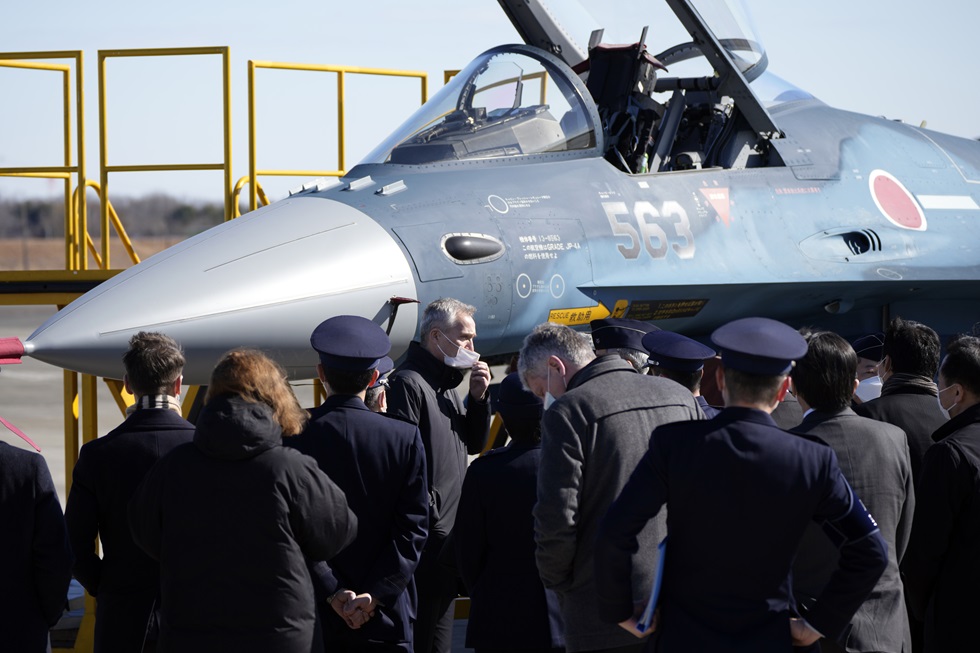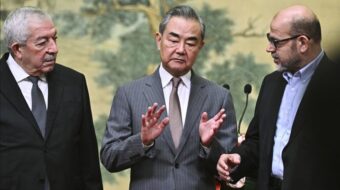
TOKYO—The Fumio Kishida government, in its Cabinet meeting on March 26, decided to allow the export to third countries of next-generation fighter jets which Japan will co-develop and co-produce with the U.K. and Italy. This outrageous decision follows the lifting of the ban on the export of lethal weapons last December.
By lifting the ban, Japan is now able to export the weapons it produces under license from foreign companies to the licenser countries. The expansion of exports of deadly weapons is based on the “three key national security documents,” which aim to turn Japan into a “war-capable state.”
The expanded arms export policy will totally undermine Japan’s postwar history as a “pacifist nation” and is nothing less than paving the road to become a “promotor of international conflicts” and a “merchant of death.”
The Japanese Communist Party (JCP) is strongly protesting the Cabinet’s decision and demanding that it be withdrawn.
The next-generation fighter jets are state-of-the-art aircraft that would be capable of fighting “in new ways that have not yet been realized in either country,” according to the government, and are the deadliest weapons.
For the U.K. and Italy, the fighter to be developed will be the successor to Eurofighter combat aircraft developed jointly by the U.K., Italy, Germany, and Spain. The Eurofighter aircraft were exported to Saudi Arabia and used in the bombing campaign in the Yemeni civil war, causing numerous civilian casualties. It is clear that the next-generation fighter jets could be used in even more devastating airstrikes if they are exported to third countries.
The government and the ruling parties claim that they will apply a brake on the export of next-generation fighter jets by imposing the requirement of “three limitations and two Cabinet decisions,” but it is obvious that such restrictions will not work as a brake.
They say that the export will be limited only to the next-generation fighter aircraft. They justified the export of the state-of-the-art fighter jets, which will have powerful killing capabilities, by supposedly not allowing other arms exports. This is illogical.
They explain that “exports are limited to partner countries that sign an ‘Agreement concerning the Transfer of Defense Equipment and Technology’ with Japan.” However, the number of partner countries in the defense equipment transfer deal, which Japan currently concludes with 15 countries, may increase as much as the government desires at its own discretion without Diet approval. They also explain that “countries where fighting is currently taking place will be excluded” from arms exports. However, a conflict may begin after Japan exports the fighters.
In addition, even if the Cabinet reconfirms the restriction pertaining to the fighter exports requiring two Cabinet decisions, it will not change the fact that the decision will be made behind closed doors without reaching a consensus of the Diet and the general public.
What they call a “brake” will not function as a brake at all. There is a possibility that the next-generation fighter jets which Japan will participate in the joint development and production of could take the lives of innocent civilians. The expansion of exports of deadly weapons may intensify export competition for fighter jets and other deadly weapons, which in turn may jeopardize regional stability.
Regarding the export to third countries of next-generation fighter jets, the government claims that the “arms market will become larger and more efficient” and presented the logic that expanding sales channels will lower costs and will increase profits by selling more. This is the very logic of the “merchants of death.”
It is tantamount to saying that the sacrifice of lives for the sake of the military industry’s profit is justifiable and that stirring up international conflicts can “feed the economy.” Japan will degenerate into a global “merchant of death.”
Japan has, even under the LDP government, been rejecting such a dangerous and degenerate course. In 1976, the then-Miki government declared the “Three Principles on Arms Exports” which virtually ban all arms exports in line with the basic principle of “not encouraging international conflicts.”
In 1981, both the Upper and Lower Houses in each plenary session unanimously adopted a resolution calling for strict compliance with the Three Principles. Nevertheless, the present Kishida government ignored the Diet’s role and forced through the historic outrage of exporting the next-generation fighter jets to third countries by having only “consultations” between the LDP and its coalition ally Komei, and by making a single Cabinet decision.
It is unacceptable that they have blatantly trampled upon parliamentary democracy. The JCP demands that the government and the ruling parties withdraw the Cabinet decision and return to Japan’s original position of the “Three Principles on Arms Exports.” In order to achieve this, the JCP will do its utmost.
Shimbun Akahata
We hope you appreciated this article. At People’s World, we believe news and information should be free and accessible to all, but we need your help. Our journalism is free of corporate influence and paywalls because we are totally reader-supported. Only you, our readers and supporters, make this possible. If you enjoy reading People’s World and the stories we bring you, please support our work by donating or becoming a monthly sustainer today. Thank you!












Comments